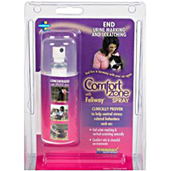The top complaints of feline behaviors are long and vary, but include:
- Destructive scratching
- Jumping on furniture or counter tops
- Aggressiveness – always talk to your veterinarian if people or other pets are in danger
- Fearfulness and anxiety
- Litter box issues
"Modifying a cat's behavior requires
consistency, fairness, and patience."
Boredom in Cats
Problem behaviors sometimes result
from boredom and a lack of activity. It isn't too surprising
that a cat that spends 10 to 12 hours a day alone will find a way to
entertain herself and sometimes not in the most acceptable manner.
If your cat seems to "get into trouble" while you are gone, try
increasing the amount of exercise and attention that she gets before
you leave. Kitty "fishing poles," tossing a crumpled piece of paper
across the floor, or flicking a laser pointer across the wall are all
ways of getting a cat to exercise. A tired cat will likely sleep
away a large portion of the day and is less likely to scratch the corner
of your couch to shreds. Also, give your cat some special toys to play with when you are away or place a
perch near a window, particularly if it has a view of a bird feeder.
Normal Feline Behavior in an Abnormal Location

Behaviors that owners take offense to, are naturally normal activities for felines, they are only problems when cats and humans cohabitate. For example,
urine marking or spraying is a way for cats to delineate their territories.
Cats are not being "bad"or trying to get back at their owners
when they spray, it is simply a way of saying "this area is mine,
not yours."
To eliminate spraying, an owner has
to deal with its underlying causes. In a multi-cat household,
pets should have an ample number of perches, hiding places, litter boxes,
food and water bowls and covered escape routes so that individuals can
stay away from each other if that is what they wish. If a cat
is responding to something that she can see through the windows, closing
the drapes or blinds may be helpful. If anxiety plays a role, sprays,
diffusers, and wipes like Comfort Zone with Feliway that
contain feline facial pheromones and natural calming supplements like Composure Soft Chews are worth a try.
Modifying a cat's behavior requires
consistency, fairness and patience. Punishment will only make
matters worse. If despite your best efforts the problems continue,
talk to your veterinarian. Sometimes a change in behavior is a
result of an underlying medical problem. Your vet can also refer
you to a veterinary behaviorist if necessary.
The above is provided for information purposes only and should not be used for the diagnosis or treatment of any condition.
This information does not cover all possible variables, conditions, reactions, or risks relating to any topic, medication, or product and should not
be considered complete. Certain products or medications may have risks and you should always consult your local veterinarian concerning the treatment of
your pet. Any trademarks are the property of their respective owners.